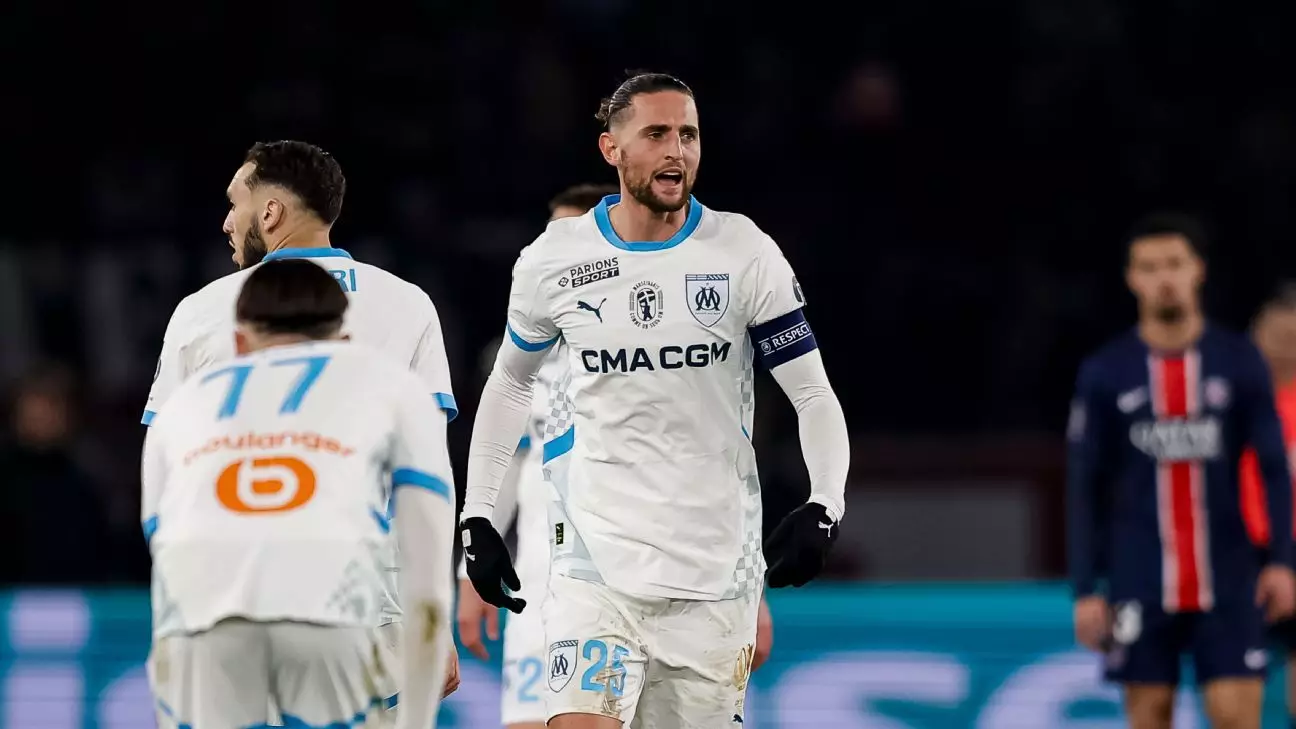In the heart of France’s renowned football landscape, a startling confrontation erupted following Paris Saint-Germain’s (PSG) 3-1 victory over Marseille. Amid the post-match chaos, Adrien Rabiot, a midfielder for Marseille and former PSG player, leveled a poignant criticism against PSG’s president, Nasser Al-Khelaifi. His remarks, underscored by the tagline “you can’t buy class,” resonate deeply amid rising tensions around issues of discrimination prevalent in the sport. Rabiot’s statement epitomized a growing discontent within French football, particularly concerning the behavior of supporters and the inaction of authorities in curbing the rampant culture of discrimination.
The Echoes of Hostility
Rabiot returned to the Parc des Princes amidst a cloud of hostility, a tumultuous atmosphere exacerbated by racist slurs and anti-gay chants hurled by sections of PSG’s fanbase. The intensity of such hostility not only targeted Rabiot personally, due to his roots in PSG, but also reflected a wider societal issue that has unfortunately seeped into the fabric of professional sports. Rabiot’s references to his mother and a deceased parent in his social media post reveal the deeply personal nature of attacks that often go unaddressed in the public sphere.
The French football scene has found itself at a crossroads, grappling with racism and homophobia among its spectators. The ugly side of passionate support was on full display this past Sunday. Rabiot’s frustration illuminates a broader debate about accountability and the responsibilities of not just players, but clubs and governing bodies alike to maintain a respectful environment in stadiums.
Double Standards and the Role of Officials
A critical observation made by Rabiot’s mother, Véronique, about the failure of match officials to interrupt the game in light of discriminatory chants raises alarming questions about the efficacy of measures presently in place. With referees possessing the authority to halt matches in response to reprehensible behavior, the inaction of Clément Turpin, one of French football’s most esteemed referees, signals a troubling inconsistency in disciplinary practices. The absence of decisive action cultivates a culture in which discriminatory behavior is tolerated, thus posing a challenge to the integrity of the sport.
The frustration is palpable; how can matches be policed effectively when the very institutions meant to uphold laws and ethical standards remain unyielding in the face of discrimination? Fans and players alike bear witness to this devolution of football culture where the price of tolerance seems to be paid not by the offenders, but by the community of inclusive values that football should represent.
A Call to Action: The Push for Accountability
In the wake of these incidents, the Rouge Direct campaign group’s demand for stringent penalties against discriminatory chanting reflects a vital step toward accountability. Their request to the French authorities emphasizes the necessity to prioritize action over empty promises and implement real change within the sport. Discriminatory chants are a reflection of deep-rooted issues that extend far beyond the stadium, inherently linked to societal structures that allow such behavior to proliferate.
Fans chanting insults that play on racial and ethnic stereotypes need to be confronted with consequences that match the severity of their actions. The fact that PSG has faced sanctions in recent years highlights a troubling cycle where punitive measures lack the immediate effectiveness needed to generate a cultural shift among supporters.
Marseille, PSG, and the Pursuit of Respect
The football rivalry between Marseille and PSG, steeped in history, adds layers to the current conflict. Yet, rivalries should flourish within a framework of respect and sportsmanship, not devolve into toxic behavior that alienates entire communities. Rabiot’s courageous stand is not just a personal grievance; it is a multifaceted cry for change that reverberates beyond the pitch. The challenge remains for both clubs and fans to cultivate an atmosphere of respect, ensuring that talent and dedication are no longer overshadowed by prejudice and animosity.
The future of football in France hinges on how these patterns are addressed. Adrien Rabiot’s boldness serves as both a reminder and a call to arms; it is time for stakeholders—clubs, referees, fans, and the media—to unite in fostering a culture where class, dignity, and humanity reign supreme. The era of allowing discrimination to shape the narrative of the world’s beloved game must come to an end, catalyzing a necessary change that champions inclusivity over exclusion.


Leave a Reply